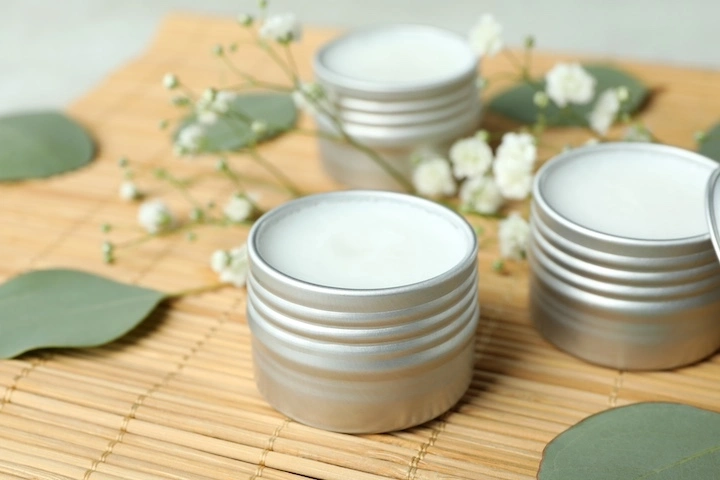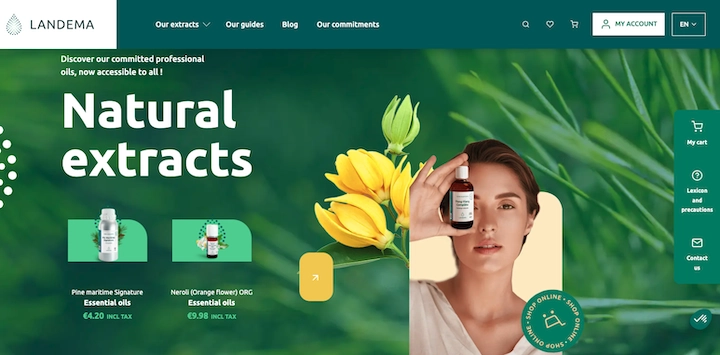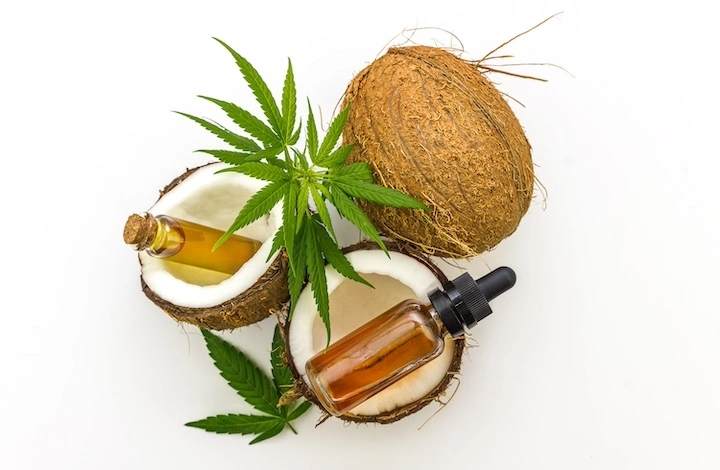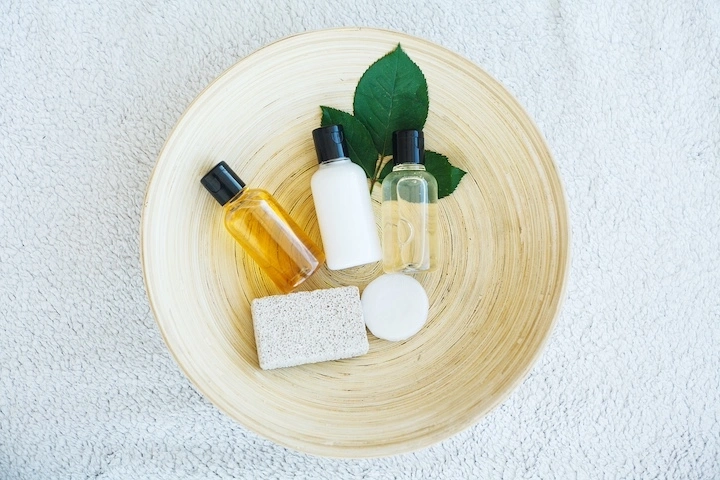
10 juillet 2024
As a cosmetic formulator, you are constantly seeking high-quality natural ingredients to create wholesome, efficacious products that align with consumer expectations. In this pursuit of excellence, organic plant oils emerge as indispensable actives, boasting exceptional and versatile properties. Explore how to strategically incorporate these botanical treasures into your formulations to enhance your clients' skin and hair, while offering eco-responsible cosmetics.
Meticulously selected organic plant oils
To ensure optimal and consistent quality, it is essential to choose organic, virgin, and cold-pressed plant oils. This gentle extraction process preserves the integrity of essential fatty acids, vitamins, and antioxidants naturally present in oleaginous plants. Additionally, prioritize plant oils sourced from sustainable, fair, and eco-responsible supply chains for a committed and transparent cosmetic approach.
A palette of plant-based actives with myriad virtues
Each plant oil possesses a unique composition of fatty acids and micronutrients, endowing it with specific properties. By judiciously combining them, you can create synergies of actives to address a multitude of skin and hair needs, for example:
- Argan oil, rich in vitamin E and omega-6, is ideal for nourishing mature skin and combating signs of aging.
- Jojoba oil, with its regulating properties, is perfectly suited for combination to oily skin.
- Coconut oil imparts shine and suppleness to hair lengths while protecting them from external aggressors.
By astutely incorporating these premium organic plant oils into your formulas, you will offer natural, wholesome, and high-performance cosmetics, acclaimed by increasingly discerning consumers who are sensitive to ingredient quality. A virtuous and responsible approach to caring for skin, hair, and the planet.
Discover how to judiciously integrate these botanical treasures into your formulations to offer eco-designed and virtuous cosmetics.
What you will discover in this article:
The 3 key points to remember:
- Organic plant oils are active ingredients with multiple virtues for skin and hair. Rich in essential nutrients, they nourish, repair, protect, and beautify all skin types naturally.
- To formulate eco-responsible cosmetics, one must prioritize organic, virgin, cold-pressed oils from sustainable sources and packaged in ecological containers. Organic labels are good indicators.
- Judiciously incorporating organic plant oils into homemade cosmetics allows for the combination of pleasurable sensory textures with the efficacy of high-quality natural active ingredients, resulting in a healthier, more ethical, and committed approach to beauty.
In summary, this article provides all the keys for professionals and homemade cosmetics enthusiasts to select the best organic plant oils and integrate them into eco-designed and effective cosmetic formulas, in line with new consumer expectations.

I. What is an eco-designed cosmetic? Criteria to consider
An eco-designed cosmetic meets precise requirements aimed at minimizing its environmental impact at each stage of its life cycle:
A. Organic, natural, and biodegradable ingredients
It is formulated with a maximum of ingredients from organic agriculture, ensuring the absence of pesticides and GMOs. Raw materials are natural, renewable, and biodegradable to limit ecosystem pollution. The ingredient list is as short as possible, containing only active ingredients strictly necessary for an effective formulation and a pleasant finish.
B. An environmentally friendly manufacturing process
Its production is designed to reduce water and energy consumption. Effluents and waste are controlled and valorized. Artificial intelligence tools are used to evaluate ingredient safety and environmental impact.
C. Eco-responsible packaging
Its packaging is designed using recycled and/or recyclable materials such as glass or certain eco-designed plastics. Refillable formats and eco-refills are preferred. The goal is to generate as little waste as possible.
D. Labels and certifications as trust guarantees
For greater transparency, it bears recognized organic labels such as Cosmos Organic, Ecocert, or Cosmébio, which attest to compliance with strict specifications. These labels guarantee the absence of controversial components and a majority of natural organic ingredients.
To learn more about the different organic labels, read the article "Navigating organic labels: what you need to know before getting started".

II. Organic plant oils: active ingredients with myriad cosmetic virtues
A. What is an organic plant oil?
- Definition and extraction methods
A plant oil is a fatty substance extracted from oleaginous plants, most often through cold-pressing of seeds, fruits, or kernels. This mechanical process, devoid of heating or solvents, preserves all the intrinsic qualities of the oil.
- The importance of choosing virgin and organic oils
The finest cosmetic oils are virgin, first cold-pressed, and derived from organic agriculture. This signifies that they are unrefined and result from a slow, mechanical extraction at a controlled temperature not exceeding 50 degrees Celsius. Thus, they retain all their natural active ingredients (vitamins, fatty acids, etc.) and are free from solvents and chemical contaminants.
B. Composition and benefits of organic plant oils
- Essential fatty acids and precious unsaponifiables
Each plant oil boasts a unique profile of polyunsaturated fatty acids such as omega-3 and omega-6, monounsaturated fatty acids like omega-9, and unsaponifiables (phytosterols, polyphenols, etc.), endowing it with specific properties.
- Protective vitamins and antioxidants
They are naturally rich in fat-soluble vitamins A, D, E, and K, with antioxidant powers that combat cutaneous aging. Some, like Argan oil, also contain phenolic compounds beneficial for the skin.
- Nourishing, repairing, and anti-aging properties
Depending on their composition, organic plant oils possess numerous cosmetic properties, including:
- Softening the skin
- Counteracting free radicals
- Aiding in skin healing and repair
- Enhancing cell membrane flexibility
- Countering the effects of aging
- Balancing sebum production
- Strengthening dermal collagen
- Nourishing skin cells
- Protecting against environmental stressors (wind, sun, cold)
- Reinforcing the hydrolipidic film and preventing skin desiccation
C. How to choose an organic plant oil based on skin type?
- Dry skin will adore nourishing oils such as Argan, Avocado, or Sweet Almond.
- Combination to oily skin should turn to regulating and balancing oils like Jojoba or Hemp.
- Mature skin will opt for anti-aging and revitalizing oils such as Argan, Rosehip, or Prickly Pear.

III. Landema: exceptional organic plant oils, respecting humanity and biodiversity
At Landema, a subsidiary of the Biolandes family group, ecological and ethical commitment is at the heart of organic plant oil selection. As Jérôme Ducasse, General Director of Landema and Director of Operations at Biolandes, explains, this commitment is evident at every stage, from cultivation to production:
A. Rigorous selection and support of producers
Landema's suppliers and partners commit to adhering to a strict ethical charter, including respect for human rights and the environment. They undergo a thorough approval process with audits, questionnaires, and quality controls.
B. Sustainable and respectful agricultural practices
Landema supports its producers in reducing chemical use, favoring organic agriculture and permaculture techniques. The objective: to respect biodiversity, optimize water and energy management, avoid deforestation, even support reforestation, and optimize waste reuse.
C. Improving working conditions and lives of local populations
Beyond production, Landema strives for better working conditions, safety, and remuneration. The company is particularly attentive to harvesting and transportation equipment, as well as protective gear for hazardous operations (such as machines that crack nut shells).
The Biolandes group also participates in the economic and social development of communities by financing schools, wells, bridges, and solar panels.
D. Demanding certifications, guaranteeing responsible sourcing
As an active member of UEBT (Union for Ethical BioTrade), Biolandes is progressively certifying all its supply chains according to this fair trade and sustainable development standard, or that of Fair for Life (FFL).
By choosing Landema.com organic plant oils for your formulas, you have the assurance of incorporating premium ingredients whose production respects the environment, biodiversity, and local populations. An exemplary and unique approach that goes well beyond the practices of most plant oil suppliers.
So, are you ready to create exceptional cosmetics that combine naturalness, efficacy, and ethics? Discover now the selection of Landema organic plant oils and let yourself be inspired by their incomparable profiles and virtues. Your creativity will know no bounds in imagining the skincare of tomorrow - that of committed and responsible beauty.

IV. Our selection of the 5 best organic plant oils to adopt
A. Organic Argan oil, the ally of mature skin
Utilized for centuries by Berbers for both its cosmetic and culinary virtues, this oil is the pride of Morocco, where it is called "liquid gold". It is derived from the kernels hidden within the shell of the argan tree fruit. Particularly rich in vitamin E and essential fatty acids, Argan oil (Argania spinosa) is ideal for nourishing dry and mature skin.
It is remarkable for its protective properties against cold, wind, sun, sand, etc., as well as its nourishing and healing qualities. It actively combats signs of aging thanks to its antioxidant and regenerating properties.
B. Organic Jojoba oil, the regulating oil for combination to oily skin
Jojoba oil (Simmondsia chinensis) is actually a liquid wax, composed of over 95% waxy esters, which gives it a long shelf life: it can be preserved for 36 months or more in a dry place. Its composition, similar to sebum, makes it an ally for acne-prone skin. It regulates sebum production, both on oily and dry skin, and rebalances the skin microbiome.
Its non-greasy texture allows it to penetrate the skin well: thus, it is an ingredient that can be included in all types of products, whether for facial or body care.
C. Organic Coconut oil, nourishing and protective
Also known as Coconut butter, Coconut oil (Cocos nucifera) is attributed several cosmetic properties due to the complexity of its lipid composition. Packed with lauric acid and vitamin E, this oil nourishes and protects oily skin and damaged hair: it leaves the skin soft and hair shiny and supple.
A study published in 2017 (see references at the end of the article) notably highlighted the antibacterial, anti-inflammatory, and healing properties of this oil, making it particularly interesting for skin diseases and repair.
Its very high saponification index (254) also makes it the most suitable oil for making soaps, both solid and liquid.
D. Organic Apricot kernel oil, for sensitive skin and a unifying effect
Organic Apricot kernel oil (Prunus armeniaca) is obtained by pressing the kernel contained in the apricot pit. It therefore does not have the scent of the fruit but a pale yellow-orange color that resembles it. Its texture is fluid and light, leaving a non-greasy sensation on the skin. Very gentle and penetrating, it is suitable for the most sensitive skin, especially that of babies.
Organic Apricot kernel oil derives its properties from its composition of various fatty acids and vitamins: it contains mainly omega-9 and omega-6, and is particularly rich in vitamins A and E, recognized for their antioxidant properties. Its high vitamin A content, also known as retinol, also gives it luminous and unifying effects on the complexion.
E. Organic Hemp oil, the soothing oil
What makes Hemp oil (Cannabis sativa) interesting is mainly its high content of essential fatty acids, which help keep the skin supple and promote its elasticity, and the presence of gamma-linolenic acid, which gives it anti-inflammatory and repairing properties.
Thus, with its ideal ratio of omega-3 and omega-6, Hemp oil soothes and regenerates irritated skin or skin prone to redness. It strengthens the skin barrier and prevents external aggressions. It can also be included in hair care products, particularly against dandruff.

V. How to integrate organic plant oils into your homemade cosmetics?
A. In synergy in your plant oil blends
Combine several complementary oils to cumulate their benefits and create unique textures. For example, mix organic Apricot kernel oil and Jojoba oil for a nourishing and non-greasy serum, or Coconut and Hemp oils for hair products.
Some oils like Sweet Almond (Prunus dulcis) have an ideal texture for massages.
B. Combined with essential oils in your formulas
Add a few drops of targeted essential oils to your plant oil base to boost their effectiveness. True Lavender essential oil (Lavandula angustifolia), rich in linalyl acetate and linalool, is anti-inflammatory, soothing, healing, and refreshing, while Ylang-Ylang (Cananga odorata), with its content of benzyl benzoate, tones the skin and hair.
To delve deeper into the subject, read "The best essential oils for skincare: a guide for cosmetics and soaps".
C. Simple cosmetic recipe ideas with organic plant oil
- An anti-aging face serum with organic Argan oil
Mix 50 ml of Argan oil with 20 drops of Geranium essential oil (Pelargonium graveolens). Apply a few drops morning and evening to smooth wrinkles and restore radiance.
- A nourishing body balm with organic Coconut oil
Melt 50 g of Shea butter in a double boiler with 50 ml of Coconut oil. Let cool then whip to obtain a creamy texture. Massage onto the body for soft and nourished skin
- A face exfoliant with organic Apricot kernel oil
Mix 2 tablespoons of organic Apricot kernel oil, 1 tablespoon of pink clay, 1 teaspoon of Apricot kernel powder, and 3 drops of Petitgrain essential oil (Citrus aurantium var. amara). Gently massage onto damp skin then rinse with cool water for a unified and radiant complexion.

Seizing the unique opportunity offered by organic plant oils
In conclusion, organic plant oils represent a unique opportunity for formulators and cosmetic brands to offer natural, healthy, and eco-responsible products, in line with new consumer expectations.
By rigorously selecting high-quality organic plant oils from sustainable and fair supply chains, packaged in ecological packaging, professionals will be able to create effective care products with unique textures and fragrances that enhance skin and hair safely.
Integrating these premium plant actives into minimalist formulas with naturally-derived ingredients will allow differentiation in the booming green cosmetics market. It is a major lever for innovation and differentiation to reach a target audience sensitive to product composition, brand transparency, and their environmental impact.
Thanks to their nourishing, protective, repairing, or purifying properties, organic plant oils provide an effective and natural response to all skin and hair needs. They offer a healthy and sustainable alternative to potentially controversial synthetic ingredients.
By focusing on these precious oils derived from nature and processed in an eco-responsible manner, brands will address growing consumer concerns for their health and that of the planet. A positive and meaningful approach to reconcile beauty, well-being, and respect for the environment.
Source of the study on Coconut oil: https://www.ncbi.nlm.nih.gov/pmc/articles/PMC5796020/
Items that could
interest
Our essential oils
will simplify your life
Your wishlist
You must be logged in to post a comment.
Login, or create an account
There is no comment for this article yet